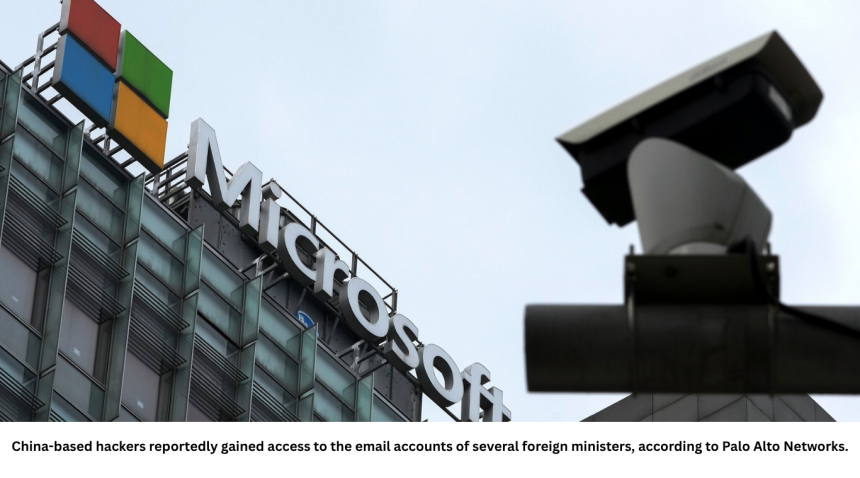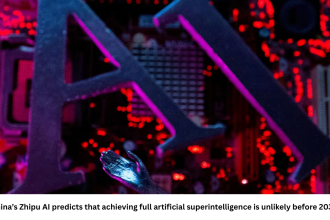Cybersecurity threats are becoming one of the biggest challenges for governments and organizations worldwide. In an increasingly connected world, sensitive information can be exposed in seconds through a single cyberattack. Recently, a major report by Palo Alto Networks revealed that hackers linked to China had breached the email accounts of several foreign ministers. This incident highlights the growing risks of cyber espionage and the complex role of cybersecurity in international relations.
- The Report by Palo Alto Networks
- How the Breach Was Discovered
- The Suspected Chinese Connection
- The Methods Used in the Cyberattack
- Phishing Emails
- Exploiting Software Vulnerabilities
- Credential Harvesting
- Persistence and Stealth
- Data Exfiltration
- Why Foreign Ministers Were Targeted
- Global Reactions and Concerns
- The Role of Cyber-Espionage in Modern Geopolitics
- The Growing Challenge of Attribution
- How Governments Are Responding
- The Importance of Cybersecurity Awareness
- The Role of Private Companies in Cyber Defense
- The Broader Implications for International Security
- How Technology Can Help Prevent Future Breaches
- The Role of International Cooperation
- Lessons Learned from the Incident
- The Human Factor in Cybersecurity
- The Future of Cybersecurity
- Frequently Asked Questions
- Conclusion
This article explains what happened in the attack, who might be behind it, how the hackers operated, and why such incidents pose serious threats to national security and diplomacy. It also explores the response from global authorities, what it means for cybersecurity policies, and what measures can help prevent similar attacks in the future.
The Report by Palo Alto Networks
Palo Alto Networks, one of the world’s leading cybersecurity firms, announced that its threat intelligence team had uncovered a campaign carried out by hackers believed to be linked to China. According to their report, the attackers successfully compromised the email accounts of multiple foreign ministers and senior diplomats.
The breach was part of a broader espionage operation targeting governments, embassies, and political organizations across different regions. The hackers were interested in gathering information about diplomatic communications, strategic decisions, and international policies.
Palo Alto Networks stated that the attack was both sophisticated and carefully planned. It involved advanced techniques that made detection difficult and allowed the hackers to remain inside targeted networks for extended periods.
How the Breach Was Discovered
The discovery of the breach came after cybersecurity experts noticed unusual network activity in several government systems. Investigation revealed that unknown actors were attempting to access official email accounts and download confidential data.
Palo Alto Networks’ threat research team traced the malicious activity to a group using tactics similar to those employed by previously identified Chinese cyber-espionage units. They found that the hackers had exploited software vulnerabilities and used phishing emails to gain entry into secure networks.
In some cases, the attackers created fake login pages resembling government webmail portals. When officials unknowingly entered their passwords, the credentials were sent directly to the hackers. This technique, known as credential harvesting, allowed the group to move through official email systems undetected for weeks or even months.
The Suspected Chinese Connection
While Palo Alto Networks stopped short of directly naming a specific group, it suggested that the hackers were likely connected to China’s state-sponsored cyber units. Over the years, cybersecurity analysts have tracked several groups operating from China that conduct cyber-espionage campaigns aligned with the country’s geopolitical interests.
China has often denied involvement in cyberattacks, but multiple independent investigations from Western intelligence agencies and cybersecurity firms have pointed to a consistent pattern. Many of these operations target government institutions, defense contractors, and technology companies in countries that have strategic or political importance to China.
In this particular case, the choice of targets—foreign ministers and high-level diplomats—suggests that the goal was to gain access to sensitive diplomatic communications. Such information could be used to anticipate foreign policy decisions or influence negotiations between countries.
The Methods Used in the Cyberattack
The hackers behind this attack used a combination of advanced techniques to infiltrate their targets. Some of the most common methods observed in this campaign included:
Phishing Emails
The attackers sent emails that appeared to come from trusted sources, such as fellow diplomats or international organizations. These messages contained links or attachments that, once opened, installed malicious software on the victim’s device.
Exploiting Software Vulnerabilities
In some cases, the hackers took advantage of unpatched software vulnerabilities in email servers or security systems. By exploiting these weaknesses, they could access entire databases of email messages without needing individual passwords.
Credential Harvesting
The hackers set up fake login pages that looked identical to official government email portals. When users entered their usernames and passwords, the information was captured by the attackers.
Persistence and Stealth
Once inside the system, the hackers used stealth techniques to remain undetected. They encrypted their communication, disguised their presence as legitimate network activity, and avoided actions that might alert security teams.
Data Exfiltration
After gaining access, the hackers copied sensitive data from the compromised email accounts. This included diplomatic discussions, confidential attachments, and personal contact lists of high-ranking officials.
Why Foreign Ministers Were Targeted
Targeting foreign ministers and diplomats is not random. These individuals manage critical communications between governments and often handle information related to national security, trade, and global alliances. By breaching their email accounts, hackers can gain valuable insights into international strategies and negotiations.
Diplomatic correspondence may contain intelligence about sanctions, defense cooperation, and sensitive policy positions. Access to such data gives attackers the ability to predict moves, manipulate situations, or use the information for political or economic advantage.
Moreover, foreign ministers often communicate across multiple platforms and regions, making them ideal targets for espionage groups seeking global influence. Attacking these high-level officials allows hackers to gather data that can affect entire governments.
Global Reactions and Concerns
The revelation of this breach has caused concern among several nations. Governments are increasingly aware that cyberattacks are not just technical issues—they are acts of modern espionage with real-world consequences.
Several countries expressed worries about the growing scale of state-sponsored hacking activities. Diplomatic sources have emphasized the need for stricter cybersecurity cooperation among allies.
Western officials have also warned that cyberattacks targeting diplomats could worsen already tense relations between major powers. If proven to be the work of a state actor, such intrusions could be viewed as violations of international law and sovereignty.
Cybersecurity experts argue that these incidents underline the importance of improving defenses at all levels of government. The sophistication of modern attacks means that even high-security systems can be vulnerable without constant vigilance.
The Role of Cyber-Espionage in Modern Geopolitics
Cyber-espionage has become one of the most powerful tools in international relations. Unlike traditional spying, cyber operations allow countries to collect intelligence remotely, cheaply, and often without direct confrontation.
Governments can use stolen data to shape foreign policy decisions, gain leverage in trade talks, or prepare for diplomatic negotiations. The information gathered through these attacks can provide strategic advantages in global politics.
China, the United States, Russia, and other major powers all operate cyber units that engage in surveillance and intelligence collection. What makes cyber-espionage particularly complex is that it often happens in a gray area—hard to prove and easy to deny.
The recent incident revealed by Palo Alto Networks fits this global pattern, where technology becomes both a weapon and a shield in political strategy.
The Growing Challenge of Attribution
One of the biggest difficulties in cybersecurity is attribution—determining exactly who is behind an attack. Hackers often hide their tracks using proxy servers, fake identities, and encrypted communication channels.
Even when a cyberattack appears to come from a specific country, that does not always mean the government is directly responsible. Some groups act independently but share goals with certain nations, creating confusion and diplomatic complications.
In this case, Palo Alto Networks’ findings suggest links to Chinese cyber activity, but they do not serve as formal proof of state involvement. Governments usually rely on combined intelligence from multiple sources before making public accusations.
This uncertainty makes international cooperation against cyber threats more difficult. Countries hesitate to accuse others without irrefutable evidence, leading to prolonged tensions and limited accountability.
How Governments Are Responding
Following the revelations, several governments have reportedly launched internal investigations to assess whether their systems were affected. Some have strengthened cybersecurity protocols and initiated new training programs for officials.
The incident has renewed calls for stricter digital hygiene practices in diplomatic environments. Governments are being encouraged to adopt stronger authentication systems, such as multi-factor login procedures, to reduce the risk of breaches.
International organizations like the United Nations and NATO have also emphasized the need for global norms that define acceptable behavior in cyberspace. However, reaching agreements on such rules has proven difficult because nations often prioritize their own intelligence-gathering capabilities.
The Importance of Cybersecurity Awareness
This attack serves as a reminder that cybersecurity is everyone’s responsibility. Even the most advanced systems can be compromised if individuals fail to follow security protocols.
Diplomats, government officials, and public servants must understand that simple actions—like clicking on unknown links or using weak passwords—can expose entire networks to danger.
Training and awareness programs are among the most effective ways to reduce risks. Organizations must regularly educate employees about phishing, data protection, and recognizing suspicious activity.
The incident involving foreign ministers shows that even people at the highest levels of power can fall victim to cyber deception.
The Role of Private Companies in Cyber Defense
Private cybersecurity companies like Palo Alto Networks play an essential role in defending against cyber threats. Governments often rely on these firms to provide threat intelligence, develop security tools, and investigate breaches.
Palo Alto Networks’ discovery of this campaign demonstrates the importance of public-private collaboration. Without such partnerships, many attacks would remain undetected or misunderstood.
Private firms have the technical expertise and global networks necessary to track cybercriminal activity across borders. Their reports often inform national security decisions and help shape cybersecurity policies.
The Broader Implications for International Security
Cyberattacks on diplomats go beyond data theft. They can disrupt communication between countries, erode trust, and escalate political tensions. If sensitive messages are stolen or leaked, it can harm relationships and damage reputations.
In some cases, information obtained from hacked emails could even be used for disinformation campaigns or blackmail. The ability to manipulate or release diplomatic correspondence gives hackers a powerful tool to influence global events.
Therefore, improving cybersecurity is not just about protecting data—it is about maintaining peace, stability, and trust in international relations.
How Technology Can Help Prevent Future Breaches
New technologies are being developed to strengthen cybersecurity defenses. Artificial intelligence and machine learning systems can analyze network activity to detect unusual behavior early.
Encryption technologies make it harder for attackers to read stolen data, while biometric authentication can prevent unauthorized access.
Cloud security platforms also offer advanced protection by automatically updating security systems and isolating suspicious activity before it causes harm.
Governments and organizations must invest in these technologies to stay ahead of increasingly sophisticated cyber threats.
The Role of International Cooperation
Cyber threats are global in nature, crossing borders and affecting multiple countries at once. No nation can handle these challenges alone. International cooperation is essential for effective defense.
Countries can share information about cyberattacks, coordinate responses, and develop shared strategies for prevention. Agreements on data security, digital sovereignty, and responsible behavior in cyberspace are necessary to maintain global stability.
The breach of foreign ministers’ emails underscores the need for unified international standards and stronger partnerships between allies.
Lessons Learned from the Incident
This incident provides several key lessons. First, even high-level officials are vulnerable if security systems are not constantly updated. Second, governments must prioritize cyber defense as much as traditional military protection. Third, awareness and training are essential at every level of public service.
The attack also shows that cyber threats evolve continuously. Defenses that worked a year ago may be insufficient today. Regular system audits, threat monitoring, and collaboration with cybersecurity experts are crucial.
Finally, transparency is important. When breaches occur, quick reporting helps prevent further damage and builds public trust.
The Human Factor in Cybersecurity
Technology alone cannot solve cybersecurity challenges. Human behavior plays a major role in both causing and preventing attacks. Many successful hacks begin with social engineering—manipulating people into giving up information or clicking on malicious links.
Therefore, creating a culture of cybersecurity awareness is vital. Employees should feel responsible for the safety of their organization’s digital systems. Simple habits, like verifying the source of emails and using strong passwords, can make a big difference.
In the end, cybersecurity is not only about computers but about people making informed decisions every day.
The Future of Cybersecurity
The future of cybersecurity will depend on constant innovation and collaboration. As attackers become more advanced, defenders must use smarter tools and share knowledge more effectively.
Artificial intelligence, quantum encryption, and automated security systems will play a growing role. Governments may also increase regulations to ensure that companies and institutions follow strict security standards.
Incidents like the breach of foreign ministers’ emails will continue to happen unless the global community treats cybersecurity as a shared responsibility rather than an isolated concern.
Frequently Asked Questions
What did Palo Alto Networks report?
Palo Alto Networks reported that hackers linked to China breached the email accounts of several foreign ministers in a coordinated cyber-espionage campaign.
Who were the main targets of the attack?
The hackers targeted foreign ministers, diplomats, and government officials to gain access to sensitive diplomatic communications.
How did the hackers gain access?
They used phishing emails, fake login pages, and software vulnerabilities to steal credentials and infiltrate secure email systems.
Was China officially blamed for the attack?
While Palo Alto Networks suggested links to China, no government has formally attributed the attack, as evidence in cyber incidents is often complex and indirect.
What was the hackers’ motive?
The attackers aimed to collect intelligence on diplomatic discussions, foreign policy strategies, and international relations.
How long did the hackers remain undetected?
According to the investigation, the attackers may have remained inside systems for several weeks or even months before detection.
What are the risks of such cyberattacks?
These attacks can expose confidential information, disrupt international communication, and damage relations between countries.
How can governments protect themselves?
Governments should use multi-factor authentication, update software regularly, train employees about phishing risks, and work closely with cybersecurity experts.
What role do private companies play in cybersecurity?
Private firms like Palo Alto Networks provide threat intelligence, tools, and analysis that help detect and prevent cyberattacks.
What lessons can be learned from this incident?
The key lessons are to stay vigilant, prioritize cybersecurity, improve cooperation among nations, and treat cyber defense as an essential part of national security.
Conclusion
The report by Palo Alto Networks about China-based hackers breaching the email accounts of several foreign ministers is a clear warning about the realities of modern cyber warfare. It shows that no system is completely safe, no matter how secure it seems. The attackers’ ability to infiltrate high-level government communications highlights both the sophistication of cyber-espionage and the urgent need for stronger defenses.
As nations depend more on digital communication, the importance of cybersecurity cannot be overstated. Governments must invest in advanced technologies, enforce strict policies, and work together to build a safer digital world. Awareness, transparency, and cooperation remain the best defenses against the growing threat of cyberattacks.
This incident reminds the world that cybersecurity is not just a technical matter—it is a cornerstone of global security and trust in the modern age.





















